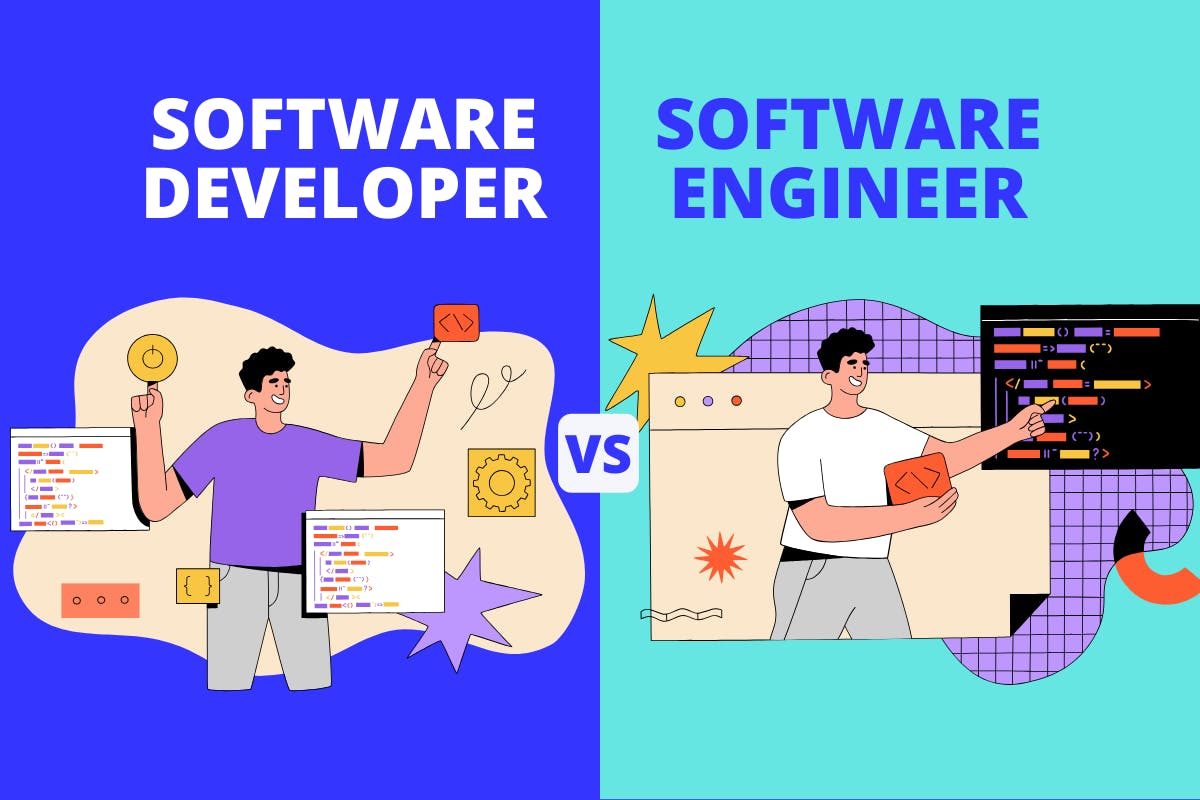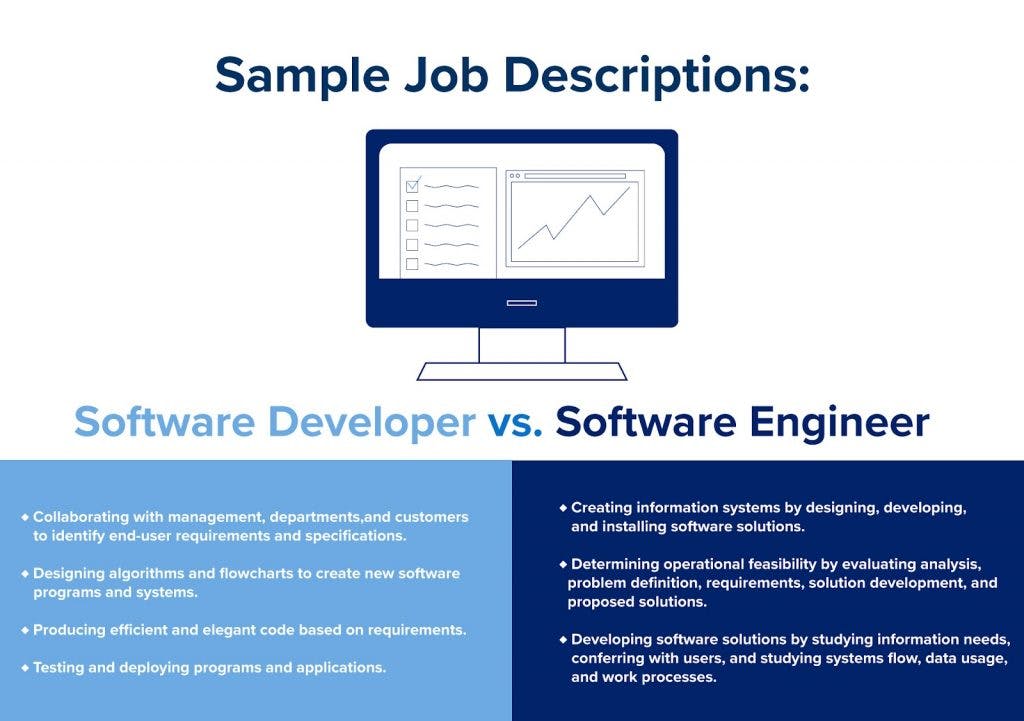

Are you considering a career in software development? Confused about the distinction between a software developer and a software engineer? You're not alone. In the world of tech, these terms are often used interchangeably, leading to a cloud of confusion.
In this blog post, we'll explore the roles of software developers and software engineers: core responsibilities, skill sets, and career trajectories of each role to help you navigate your career path with clarity.
Whether you're a curious beginner exploring the world of coding or a seasoned professional looking to understand the nuances of the industry, this blog post will shed light on the key differences between software developers and software engineers.
Software developers are the architects behind the scenes, crafting software applications that run on a variety of devices. They're the ones who start from scratch, writing the code that powers everything from desktop tools like Photoshop to mobile apps like Instagram, and even the web applications we use every day, like Facebook and Twitter.
A software engineer is essentially a pro at applying software engineering principles to design, develop, maintain, test, and evaluate computer software.
Absolutely! While "software developer" and "software engineer" are often used interchangeably, there can be variations in the scope of each role depending on the company and team. To figure out if a company is using these terms interchangeably or with distinct meanings, it's best to look at the job description first. Then, during the interview, you can directly ask the hiring manager about the day-to-day responsibilities, how the role fits into the team, and what the objectives are. This will give you a clearer understanding of the specific scope of the position.

A software developer makes use of their technical know-how to write and maintain software for a client. A software developer must be able to view the program they are writing from a holistic point of view. This makes software developers part of the entire life cycle of the program being written.
On the other hand, a software engineer does more than just create software. They apply engineering principles to develop a range of programs and manage hardware. They also focus on building good relationships among everyone involved in software projects. As software engineers, need to be good at coding and understanding algorithms, data structures, and the latest web development practices.
Becoming a software developer or engineer means you need to have certain education and skills. This usually involves knowing computer science basics and then going deeper based on what you want to specialize in.
A software developer might start with a bachelor’s degree in computer science and then take extra classes in software development. Some colleges offer specific degrees in software development, and there are also online courses available for learning.
Most software engineers also have a bachelor’s or master’s degree in computer science or software engineering. While you can learn similar things from other sources or courses, they might not match the quality of education you get from a university.
The software building process includes all the steps in creating a software application, known as the software development life cycle (SDLC). These steps cover planning, requirements, design, building, documenting, testing, and deploying the software. A software developer handles different parts of this process, like designing, building, and testing specific tasks.
On the other hand, a software engineer is involved in the entire SDLC from the start. They act as project architects, outlining how to achieve the project by breaking it down into tasks. Software engineers plan and outline the requirements for the software, assign tasks to team members, and ensure the overall architecture, both hardware and software, remains intact.
The way software engineers and developers work each day is described as their "nature of activity." Software developers usually work independently, focusing on their tasks without much need for teamwork. However, they still need good communication skills and teamwork abilities.
On the other hand, software engineers work closely with team members as their tasks involve more than just coding. They collaborate with others on various software development aspects, making teamwork essential to their role.

Members of an SDLC team approach their tasks differently. Software developers tend to have a more artistic and creative working style. They can explore various approaches to solving problems and come up with unique solutions.
Software developers use principles, past experiences, and creativity to write code for the software they're assigned. They consider the client's needs and expectations while creating the software.
In contrast, software engineers solve problems on a larger scale. They rely on engineering concepts, math, and scientific reasoning to analyze and solve problems. While they follow logical thinking patterns, it doesn't mean they work like robots; they still create personalized solutions.

In every profession, individuals rely on specific tools to get their job done efficiently. This holds true for computer programming and software development as well.
Software developers use tools like RAD Studio, Collaborator, Linx, and Studio 3T to design and build programs. They work with existing tools to create mobile and desktop applications.
Software engineers often create their own tools instead of using existing ones. They may develop tools like Visual Studio and Eclipse that other programmers then use to build software.
When it comes to skills, software developers and software engineers share many similarities. They both need to be analytical, good problem solvers, adept at troubleshooting, and effective communicators. Yet, there are some key distinctions between the two roles that you should consider when choosing your career path.
Both software developers and software engineers have abundant career opportunities in the tech industry. Here are some common career paths and opportunities for professionals in these roles:
Here are some roles in software development:
Additionally, software developers and engineers can explore opportunities in research, entrepreneurship, consulting, and specialized fields like artificial intelligence and blockchain.
In Malaysia, the salary structure for software developers and software engineers can vary based on factors such as experience, qualifications, and the specific industry or company. On average, software developers may start with a lower salary compared to software engineers, especially those with entry-level positions or less experience. However, as they gain more skills and expertise, their salary tends to increase steadily over time. On the other hand, software engineers typically command higher salaries, reflecting their advanced knowledge of software engineering principles and their ability to design and develop complex systems.
The salary range for software developers in Malaysia could start from around RM 3,000 to RM 4,800 per month and go up to RM 8,000 to RM 12,000 or more for experienced professionals.
Meanwhile, software engineers may earn salaries ranging from RM 4,300 to RM 5,900, with experienced engineers potentially earning RM 12,000 to RM 18,000 or more per month, depending on their expertise and the demands of the industry.
Good communication with clients is key in software development. If there's a lack of clear communication, the end product may not meet the client's needs. Software developers engage with clients to understand project details and ensure each feature aligns with the client's vision.
Software engineers also interact with clients, but their focus is on grasping the project's overall concept. Similar to architects, they use this understanding to plan strategies and break down tasks for the final project.

Software engineers encounter several significant challenges in their work:
1. Safety-critical sectors like space and nuclear power plants pose high risks if software fails, making failure costly and potentially life-threatening.
2. Meeting the rising market demand is a constant challenge for software engineers.
3. Coping with the growing complexity of software requires the development of new applications.
4. Ensuring different software systems can effectively communicate with each other adds to the complexity of the job.
Software developers encounter various challenges in their work:
1. Understanding end-user requirements can be challenging and may lead to misinterpretations.
2. Adapting to changing requirements during the development process can be difficult.
3. Working with models that don't fit together can create complications.
4. Developing software that is hard to maintain or extend poses a challenge.
5. Identifying important project flaws late in the development cycle can be problematic.
6. Maintaining high software, quality, especially in low-cost projects, is another common challenge developers face.
In conclusion, while the terms "software developer" and "software engineer" are often used interchangeably, there are distinct differences between the roles and responsibilities associated with each.
Software developers primarily focus on building and coding software applications, often working independently or in smaller teams. On the other hand, software engineers take a broader approach, applying engineering principles to the entire software development lifecycle, including planning, design, implementation, and maintenance.
Understanding these differences can help you navigate your career paths more effectively and make informed decisions about your professional development in the dynamic field of software development. Whether pursuing a career as a software developer or a software engineer, both roles play critical roles in shaping the future of technology and innovation.
If you are interested in becoming a software developer, check out our software development bootcamp. This is a coding bootcamp in Malaysia where you can learn to build some awesome projects, even if you have zero coding experience.
Want to learn to find out more about what we do?
Learn more here: https://sigmaschool.co
Let’s get social! Find us on:
Facebook: https://www.facebook.com/joinsigma/
Instagram: https://www.instagram.com/joinsigma/
Linkedin: https://linkedin.com/company/79085028/